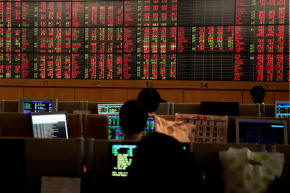Stock markets struggle as fears over economy grow
 Send a link to a friend
Send a link to a friend
 [May 16, 2022] By
Elizabeth Howcroft [May 16, 2022] By
Elizabeth Howcroft
LONDON (Reuters) -European stocks slipped
on Monday and Wall Street was set for a lower open, as investor
sentiment struggled to recover from last week's sell off amid fears of a
slowdown in economic growth.
Global shares hit their lowest point in 18 months last week, with
investors worried that rising interest rates to counter high inflation
will damage the global economy.
Unexpectedly weak economic data kept from China kept those worries in
centre stage on Monday. April retail sales plunged 11.1% on the year,
almost twice the fall forecast, as full or partial COVID-19 lockdowns
were imposed in dozens of cities. Industrial output dropped 2.9% when
analysts had looked for a slight increase.
At 1104 GMT, the MSCI world equity index, which tracks shares in 50
countries, was up around 0.1% on the day, struggling to recover from
last week's lows.
Europe's STOXX 600 was down 0.2% while London's FTSE 100 was down flat.

U.S. stock index futures pointed to a lower open for Wall STreet, with
Nasdaq futures down 0.4% and S&P 500 futures down 0.3%.
"Inflation’s still relatively high… it’s something that keeps markets
relatively unnerved. At the same time there’s more tightening coming
from central banks," said Antoine Lesne, head of ETF strategy and
research for EMEA at State Street's SPDR.
"It’s difficult to find a hedge against falling equities in this
context," Lesne said.
Some investors have been looking to buy the U.S. dollar, gold, or
shorter-duration fixed income, he said.
European government bond yields rose, with Germany's 10-year yield up 4
basis points at around 0.988% - still below the roughly eight-year high
of 1.19% it reached last Monday.
The European Central Bank will likely decide at its next meeting to end
its stimulus programme in July, and raise interest rates "very soon"
after that, ECB policymaker Pablo Hernández de Cos said on Saturday.

[to top of second column] |

Traders are seen in front of a screen with trading figures in red at
Thailand Stock Exchange building in Bangkok, Thailand March 13,
2020. REUTERS/Juarawee Kittisilpa/Files

"Investors have shown that their focus is increasingly on recession
risk," wrote ING rates strategists in a note to clients.
The economic growth concerns could allow government bonds to function as safe
havens, ING said.
"It would take a lot of optimism for 10Y Treasuries and Bund to test 3% and 1%
to the upside in our view," they said.
At 1137 GMT, the U.S. 10-year yield was at 2.9130%.
The dollar index, which last week surged to a 20-year high of 105.01, was down
around 0.1% on the day at 104.41.
The euro was near its lowest since 2017. ECB policymaker Francois Villeroy de
Galhau said the euro's weakness could threaten the central bank's efforts to
steer inflation towards its target.
Sky-high inflation and rising interest rates drove U.S. consumer confidence sink
to an 11-year low in early May and raised the stakes for April retail sales due
on Tuesday.
Meanwhile, UK inflation data due on Wednesday is expected to show prices rose
9.1% year-on-year.

Oil prices slipped as investors took profit from a recovery in the previous
session.
Brent crude futures were down 1.1%, at $110.29 a barrel at 1121 GMT, while U.S.
West Texas Intermediate (WTI) crude CLc1 futures were down 1% at $109.44 a
barrel.
Bitcoin was trading at around $29,967. Last week it plunged to as low as
$25,401.05 - its lowest since December, 2020. Already hurt by declining risk
appetite, cryptocurrencies sold off last week when a popular stablecoin,
terraUSD, collapsed and lost its dollar peg.
(Reporting by Elizabeth Howcroft, editing by Ed Osmond and Chizu Nomiyama)
[© 2022 Thomson Reuters. All rights
reserved.]
This material may not be published,
broadcast, rewritten or redistributed.
Thompson Reuters is solely responsible for this content. |